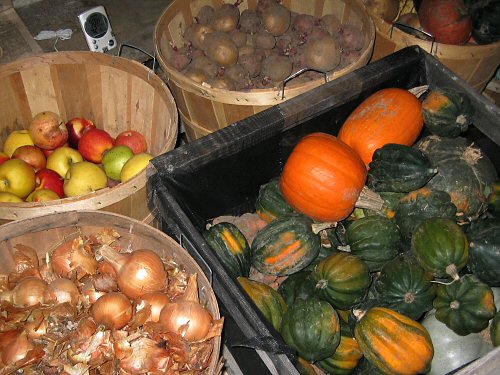In the first post on the subject of staples, I'll deal with the sorts of dry goods that are so handy to have on hand that they and up being basic building blocks on the diet.
Now, when I say dry goods I don't necessarily imply that they are actually dry things that you need to boil before you can use; what I mean by dry goods are items that you would have in your pantry that require no special storing methods to keep them. Pretty much anything that is "store and forget" is filed under the general heading of dry goods.
First off, you have to have some starches at hand. You should have a selection of pastas, for which I would recommend having two or three different kinds at hand. Go for some long noodles, like linguine, spaghetti or tagliatelle, and some short, like penne rigate, elbow macaroni or farfalle. You should have some long and some short, as they deal with different types of dishes and sauces, and variety is always a good thing. By default you'll want to go for ones that are listed as being made of durum (hard) wheat, but if you have particular requirements, whole wheat, spelt and rice (for the gluten-free dieters) are possible options.
Another starch you should keep at all time is the multitasking rice. A good amount of good old long grain white is a must, but you can add in some basmati, jasmine or brown rice for variety and different match-ups in your ethnic dinning. If you have a good freezer and a microwave, you can prepare large batches of rice, portion and freeze it, saving you quite a bit of time for when you're running short.
There are a few items that are worth keeping around in the canned goods: a few cans of beans saves you a lot of hassle and work, and you don't really save much by buying the dry stuff and cooking it yourself. Personally I keep white kidney, chick peas and some mixed beans on the shelves, its an easy source of extra proteins when you're short on meats, or if you need to get vegetarian in a pinch.
Tomatoes, both whole and diced are a must if you enjoy quick pasta dishes; they also come in handy when preparing stews and chilli, not to mention soups or couscous. A useful (and delicious) supply to keep around is some form of olives: a can of good old black olives, pitted and kept in water is an easy source of proteins, and an quick way to vary many dishes. Personally, my go-to varieties are plain black, Kalamata, Moroccan sun dried and pitted green in brine.
Speaking of sun dried, sun dried tomatoes are something of a must, an easy and convenient way to keep the fruit around all year without them going bad on you. Whether you get the dry bagged ones, or those in oil, they are incredibly useful and an easy way to party up a pizza, pasta sauce or stew. My preference is for the ones in oil; you'll want to try a few brands, as they are not all equal, some are dry and nasty, others tender and delicious.
Rounding up the pantry, we're looking at the unprocessed stuff that you can (and should) have around. Onions should always be present, as they are truly a basic item, and can be a meal unto themselves. Garlic go without saying, and if you're feeling adventurous, a small bag of shallots come in handy when you want either small quantities, or just something a little more subtle.
Squash are a wonderful family and they are rather long-lived. You can buy a lot in the fall around harvest time and keep them most of winter. Potatoes are so versatile, its like rice. If you happen to have a cold room, store them there, and add rutabagas, carrots, leeks and apples, so that they don't get lonely during the winter months.
Once you've got a hold of most of these guys, you're on your way to have a decent pantry. Of the things that I don't mention that fall into the "good idea" contingent, you could throw in a few cans of good soup (its worth hunting around for the stuff), pre-made pasta sauce (you can always kick it up a few notches) and bouillon cubes. Already with that stuff here you can make a decent selection of dishes; when you add in some of them upcoming staple friends, you'll be multiplying your menu.
While it's true that its not so much what you have, but what you do with it that matters, quality does count, when you can afford it. You don't have to go and splurge on everything every week, but keep an eye out for opportunities and make the best use of your supplies and suppliers. In the end, yur patience will be rewarded.







I never thought about freezing rice. How does this affect the consistency of the rice? Also, I never use dried tomatoes much, actually hardly ever. The times I used them they were really strong and I didn't care for them much. But when I'm out and have had them in salads or pasta they are really good. Do you think it was just the brand or type I bought?
ReplyDeleteFreezing rice is not a huge problem, and due to its texture, it handles the freezing process with little impact.
ReplyDeleteThe right kind of sun dried tomato can make huge difference, like the difference in vodkas. The price difference between the cheap stuff and the delicious fare is too small not to splurge the little bit of extra.